- Home
- Jane Arbor
Sandflower Page 6
Sandflower Read online
Page 6
Even more disarming was Beth’s willingness to work quite hard at the painting of the bungalow. She made an exciting novelty of the fact that it was the first prolonged physical work she had undertaken since her illness, and as she had a neater hand and eye than Liz, she did the precision painting of lintels and window frames while Liz took on the rest.
In fact, for Liz, painting was indeed a happy “sloshing” of bright new color on as broad a surface and with as opulent a brush as possible. And she was thus engaged on the roof one morning—painting the new flower tubs in bands of green, gold and blue—when she heard Beth talking to someone below.
She listened idly to the murmur of voices. Then it stopped, and a minute or two later Roger Yate’s head appeared at the top of the exterior iron ladder leading onto the roof.
Surprised, Liz knelt back on her heels, allowing her full brush to drip unheeded. “Hello...” she began, but stopped, taken aback by his expression as he came to stand over her.
“What do you mean by making Beth slave away at this wretched painting of yours when she’s about ready to drop with weariness?” he accused.
“When she’s—what?” Aghast at the injustice, Liz scrambled to her feet and felt she couldn’t care much that her paint brush had bespattered him as she did so. Facing him, she declared hotly, “I’m not making Beth slave at anything. How could I? She is doing the shutters because she’s better at it than I am, and because she wants to. As for being tired out already—she can’t be!”
“Really? The sarcasm behind the drawled word stung. “And I suppose you know better, even if she says she is tired, and I can tell from one glance at her, tottering on that stepladder? And consider she’s been here since about eight, she tells me—”
Liz shrugged helplessly. “All right—so you think she’s worn out. And she has been here since eight—she likes to come while the morning is cool, in fact. But she took petit dejeuner with dada and me, and we’ve both been on the job for—” she consulted her watch “—not much over an hour. So she must have been joking if she told you she was tired already, and as she couldn’t possibly have claimed I was slavedriving her, you must have made that up!”
His heavy brows drew down and his jaw tightened. Making each word count, he said, “Beth was not joking. And I didn’t invent the rest. She didn’t complain at all until I warned her against doing too much. But then she said she daren’t stop, tired as she was, because you were so mad keen on getting every nook and cranny dolled up before some fool party you’re planning. And being as strong as a horse yourself, you probably couldn’t see when it was nothing, but willpower that kept other people going.”
Liz stared at him. “Beth said that! But—but there’s no special urgency for the sake of the party. We haven’t even fixed the date yet! And she likes painting. She begged to help with it, and she often wants to go on, even when we’ve agreed to stop. No, she couldn’t have—Anyway, I’m going to ask her, and we’ll see!”
And, brushing unceremoniously past him, she strode across the roof to a point immediately above the window on which Beth had been working. Here the parapet came only to her shins, with higher levels at either side. Holding on to one of these, she craned down, looking for Beth and, when she could not see her, leaned out at a yet more perilous angle.
Behind her she heard Roger Yate say sharply, “Beth isn’t there. I sent her indoors to rest.” But by then her foothold was slipping ... slipping ... and the next moment he had caught at her free hand to fling her around so violently that she was literally whirled into his arms, caught and held so closely against his hard body that the glitter of sudden anger in his eyes was almost out of focus to her own.
“You young idiot!” he muttered, not releasing her until she pressed down upon his arms, feeling their muscles taut as steel cords under her fingers. She felt weak at the knees and a little sick as she faced him, mortified and frustrated.
“I—I wanted to face Beth with those lies—if she ever told them!” she panted.
“And a pretty argument you’d have had, if you’d landed below with a broken limb or two, if not worse!” he retorted. “Anyway, I told you Beth wasn’t there, didn’t I?”
“Not until I’d reached out too far to lever myself back. But, I daresay I‘d have got back somehow, without your help! And now I’m going straight down to ask Beth about it,” she defied him.
“No, that you’re not!” As she turned, his fingers closed around her wrist in a viselike grip. “You’re certainly not going to upset Beth with accusations while you’re in the tizzy of temper you’re in at present.”
She wrenched free, massaging her wrist. “And who’s going to stop me?” she demanded.
‘I am, if you must know. By the simple expedient of taking Beth with me when I leave. When you’ve cooled down sufficiently, you can hammer it out between you. Only remember—I didn’t accuse you on her evidence so much as on seeing for myself that she was swaying with fatigue and how distressed she was at the thought of letting you down.”
“Well, at least she told you I was driving her for the sake of a party we’ve hardly begun to arrange!” Liz reminded him.
“The actual date of your party is neither here nor there. Somehow you’d imbued her with a sense of urgency over it and, loyal young soul that she is, she was intent on doing her part, I suppose.”
“And I suppose she may have asked you to look in this morning, to see how she was being overworked?” Liz challenged.
“She certainly did not.” His tone, deliberately cool, held a danger signal. “I came hoping to catch your father if he were going out to the oil site. To ask him to take a prescription with him and to call me at once if a patient I’ve got out there appeared to be worse. Satisfied now that I didn’t come to spy?”
Liz flushed. “I’m sorry. But dada has already gone.”
“Yes, so Beth told me. It doesn’t matter. I’ll go out myself and take her with me for the drive.”
He turned away, only to pause at the top of the ladder. “I’d have liked to invite you, too,” he said. “But I’m afraid I’ve no wish to see you sink your claws into Beth while you’re still smarting with a sense of grievance that I’ve triggered off. I don’t think any of us would enjoy our morning.”
Liz waited, raging, until she saw him drive off with Beth. Neither of them glanced back toward the roof, and if Beth was bravely masking her weariness with a show of animation, she was doing it very well. When they had gone Liz began to paint again with more vigor than accuracy, but the whole task had somehow gone sour on her. Ramming her brush into its turpentine pot, she wiped her hands and climbed down the ladder. Andrew wouldn’t be back until the late afternoon, which meant that she would be alone for the midday meal she should have been sharing with Beth. Anticlimax with a vengeance, when even her chief enemy had been whisked away before her eyes!
She decided listlessly to go down to the club for a swim in the tiny pool. She might even lunch there, too. And, meanwhile, she would not think of Beth, wide-eyed, innocent, gay, spinning along at Roger Yate’s side!
Going to her room, she collected her swimsuit, cigarettes and a book and, on a sharp impulse of defiance, sent her wide-brimming hat hurtling into a corner.
That had been silly. She would only have to pick it up. No one else would, and it wasn’t as if anyone was at the receiving end of the defiance. Anyone at all...
On her way to retrieve the hat she paused at the deep window embrasure that offered handy shelf space for a few personal treasures. Dada’s and mama’s photographs stood there and so, at first, had the seaside bucket and spade that had traveled out with her. But in its place now was the piece of rose de sable that “anyone” she had in mind had given her.
She took it up, cupping her hands around its rough flower shape as his had done in gentleness.
Gentleness. Justice. A “treading softly”—that was all she wanted of him, she told herself. But was that all? Was it? She found she shirked the answer.
&nb
sp; CHAPTER FOUR
As IF BY tacit agreement with Roger Yate that her sense of injury should be given time to abate, Beth did not come near Liz for several days. And when Beth did reappear she was so much her airy, ingenuous self that Liz found confronting her with accusations about as satisfactory as trying to punish a feather pillow.
Beth neither denied nor admitted anything. No, of course she hadn’t been really tired. Surely Liz didn’t need to be told how much she loved being allowed to help? Suddenly she had felt a bit faint, that was all. But she hadn’t realized she wasn’t safe on the stepladder until Roger insisted and lifted her down—bodily in his arms! And yes, she had told him she thought Liz, being new to the desert—which of course she couldn’t help!—didn’t appreciate that the climate rather sapped the endurance of people who hadn’t been trained to charge up and down hockey fields at school, or to do physical jerks in a bracing nor’easter before breakfast—Candid, bland, Beth concluded, “And then Roger hustled me indoors, muttered something about, ‘Well, young Liz Shepard has it coming to her here and now; she’s not going to make a galley slave of you,’ and dashed off, up to the roof to you. I couldn’t stop him, Liz. Really I couldn’t! You know how rather attractively masterful he always is where I’m concerned, don’t you?”
To which Liz said flatly “Yes,” finding it easier to agree than to argue the issue further. Somehow, it didn’t matter much any longer whether Beth had lied or not. But that wasn’t because time had cooled her indignation! It was because she suspected Roger Yate would always take Beth’s side against her, whoever was in the right. And though that hurt, it wasn’t anything she could fight against.
Meanwhile, she was accepting quite happily the pattern of her new life, adapting herself to her father’s routine at most points, but at others, altering it a little with his agreement.
For instance, he would not hear of her taking over the whole of the catering and cooking for them both. His lease of the bungalow was conditional upon his using the hotel’s service, and he could not go back on that. But he gave her complete freedom in the ordering of their meals, and compromised to the extent of allowing her to prepare their breakfast of rolls and coffee. Occasionally, too, she ventured ambitiously on their evening meal, though as a general rule she had only to see to its ordering and punctual service. And though this was not quite the “keeping house for dada” that she had envisaged, she had to admit ruefully that in the matter of housewifery of any sort she had a good deal to learn.
That was where Janine Carlyon was a pillar of strength. In Janine’s kitchen and under her experienced eye, Liz experimented to her heart’s content. “And the best thing about you,” she told Janine gratefully, “is that, once you’ve told me what to do, you don’t hang over me saying ‘don’t!’ all the while. You let me finish before you tell me where I went wrong or why.”
Janine smiled. “That’s because of my theory that some people learn best through their own mistakes. Especially the slightly willful ones—
“Willful! D’you think I’m willful?” demanded Liz.
“No, not really. But you’re an individualist, a bit of a fighter. You like to tackle your problems head-on, I think. And I judge that you would always rather ‘start again at your beginnings’ than submit to being guided carefully through every step.”
“Yes, I think I would,” Liz agreed, and remembered Robin with clarity for almost the last time. Robin was a mistake that she had already seen through and lived down. Yet how she had resented interference—Marta Gethin’s, dada’s—with that affair! And how wise Janine was, to be willing to stand by and let people be themselves, however foolish or headstrong they were in the process!
For herself she made one rule she determined to keep. If she was not to be a complete housekeeper for Andrew, at least she would be as much of a companion to him as possible. How had Roger Yate put dada’s need? “Someone to come home to”—or words to that effect. Well, she must be that someone by always being there when dada did come home. It wasn’t always easy, since his work did not occupy set hours. But she had contrived to manage it up to date, and was amply rewarded by his confident “Hey, Liz!” whenever he came in, and by his complete relaxation whenever they were alone together.
As he had suggested, on several evenings he took Liz for dinner at the club, where she met other executives of Pan-Sahara Oil, young marrieds who had quarters in Tasghala, and single men on their period of leave from the oil site. And with the housewarming only a few days off, Andrew took Liz out to the site for the first time.
It was also her first trip of any distance into the open desert, by the road that she had seen from the aircraft. Beyond the confines of the European quarters, it ran between straggles of mud huts where women sat spinning wool in the doorways and where every pitifully small patch of arid garden had its set of whitened horse’s ribs, as a guard against the evil eye. The car’s passing was signaled on all sides by a dogs’ chorus, to which the hens from every rooftop poultry run added their cackle. Here and there a ram or a mule or camel trod its patient way around a primitive waterwheel; then the dusty palms and the human dwellings thinned, and the road became a stony, climbing track with the desert spread on either side, bare and treeless and glaring.
The road itself was a hard, compacted surface, its limits marked for a few kilometers by cairns of stones, later by nothing at all. Andrew, driving fast and confidently upon it, told Liz that such a good surface was known as reg, and that it held all the way to the oil site.
“The thing to be dreaded in the desert is fechfech,” he told her. “That’s lightly crusted sand which looks firm but is about as treacherous as an uncovered well. Once in fechfech in a car, and you have to dig yourself out, foot by foot, if not inch by inch. And the only way fechfech betrays itself is by a slight difference in color from firm sand, which only experienced men can recognize.”
“But there’s none on this road?” queried Liz.
“Oh, no, and in a year or two we’ll have as good a surface as an English highway. The only petty annoyances now are the barkanes—little dunes, swept by the wind into crescent shapes, rather like breakfast rolls, which in places are continually creeping and edging across the track. But one can always dodge them or drive over them—they’re nothing much.”
“No worse—than the—ordinary bumps?” panted Liz, as the car took a particularly stony stretch at speed.
Andrew laughed and slowed down. “Sorry, Liz! I didn’t mean you to risk a cracked, skull. But look—would you care to drive yourself for a while? It’s quite safe; you can take it as slowly as you like, and it will give you confidence with the Land Rover, in case you ever have to handle it in an emergency.”
They changed places and Liz took the wheel. In England she had taken her driving test on a small car, but this one responded as easily, and she soon pulled up to the pace they had been making before.
Andrew nodded ahead. “Halfway point. The borj—it’s just a desert resthouse, really-—of In Taj. Better let me take over now; it’s a tricky descent into the wadi.”
A kilometer of steep drop took them to the dried riverbed with its handful of palms and thirsty-looking scrub. Then they were climbing again, and once more on the open track when Andrew suddenly said “Look!”
Liz looked, and caught her breath at the magical sight. On the horizon, darkly silhouetted against the heat-hazed sky, a line of laden camels and their riders strung out, traveling east to west on their timeless way. As she watched them, something rose in her throat, and when Andrew explained, “Must be a Berber caravan, carrying salt and dates to their nearest market,” she protested quickly.
“Oh no! Why, they’re—fairy-tale! They are the desert just as everyone imagines it!”
At her entranced tone he glanced at her. “But not all of it. The dream, but not the stark, cruel reality. And not the future we hope for it, and which we’ll achieve, God willing, in time.” He paused. “You’re not too disillusioned yet, Liz? Tell me—”
> She said, meaning it, “I’m not disillusioned at all. You see, I didn’t expect too much.”
“No regrets to report?”
“No regrets.”
“Nice Liz. That’s happy hearing for me. ” He brushed the back of his hand lightly across her cheek and they smiled at each other in complete accord.
Now ahead of them, and looking deceptively near in the brazen light, reared the derricks and pipes of the oil bore, a black, man-made forest against the sky. Nearer in, Liz could make out the groups of flat white huts that were the living quarters of the mechanics while they were working nonstop shifts around the clock at the bore. Beyond the workings on all sides stretched the endless stretch of the desert, dwarfing the spread of the buildings and even the towering derricks to the scale of a model set out upon a sand table.
Outside a larger hut than the rest, its door labeled Administration, Andrew drew up. “Well, here we are, Liz. It’s no Kuwait yet, as you can see. But give us a few tomorrows and you’ll drive in on a real road; there’ll be a town housing thousands, instead of hutments for a hundred or so men without women, and it will have an airport of its own. Meanwhile, I’ve some things to see to, and we’d better find someone with time on his hands, to show you around.”
In the administration building there was a refreshing air of informality that put Liz at ease at once. All the men going about its corridors or seated at desks were young, and though to Andrew they were Dan or Ted or Chris, as if they were boys in his charge, they all seemed to be skilled engineers, geologists, or designers, holding down jobs of responsibility though they would have been mere juniors at home.
Their undisguised eagerness to be introduced was most flattering, and if she had wished, she could have had a dozen escorts around the site. Andrew’s choice fell on Chris, a geologist in charge of the bore’s seismic crew, who explained to Liz with vague modesty that that meant they “listened for earth tremors and things on a gadget and reported back.”

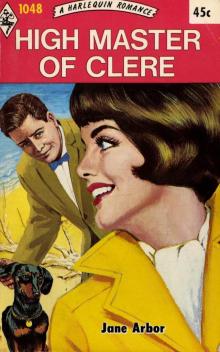 High Master of Clere
High Master of Clere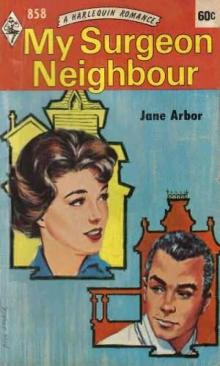 My Surgeon Neighbour
My Surgeon Neighbour Lake of Shadows
Lake of Shadows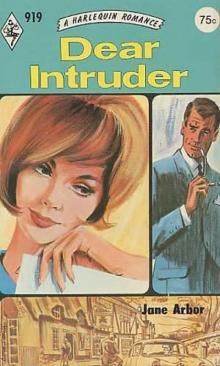 Dear Intruder
Dear Intruder Flash of Emerald
Flash of Emerald Return to Silbersee
Return to Silbersee Far Sanctuary
Far Sanctuary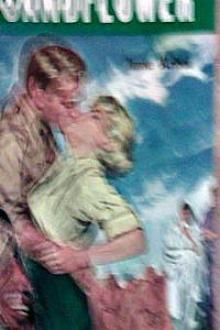 Sandflower
Sandflower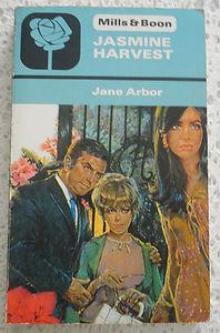 Jasmine Harvest
Jasmine Harvest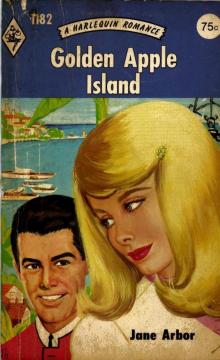 Golden Apple Island
Golden Apple Island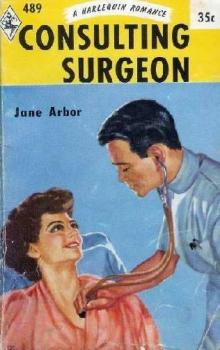 Consulting Surgeon
Consulting Surgeon Pact without desire
Pact without desire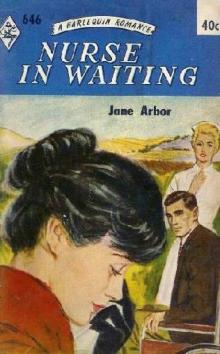 Nurse in Waiting
Nurse in Waiting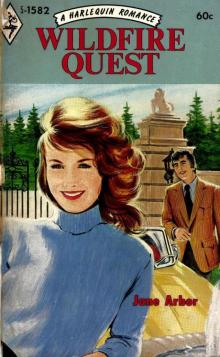 Wildfire Quest
Wildfire Quest Roman Summer
Roman Summer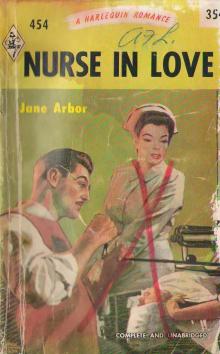 Nurse in Love
Nurse in Love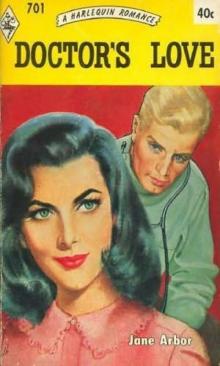 Doctor's Love
Doctor's Love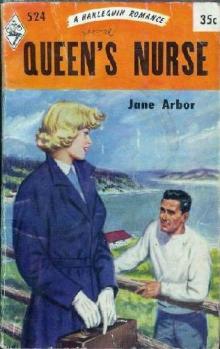 Queen's Nurse
Queen's Nurse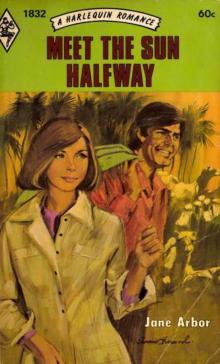 Meet the Sun Halfway
Meet the Sun Halfway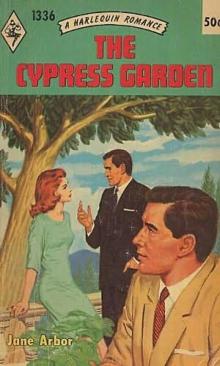 The Cypress Garden
The Cypress Garden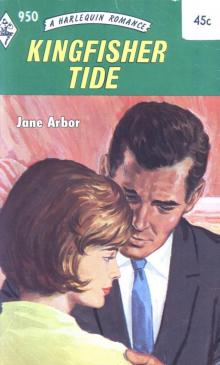 Kingfisher Tide
Kingfisher Tide A Growing Moon
A Growing Moon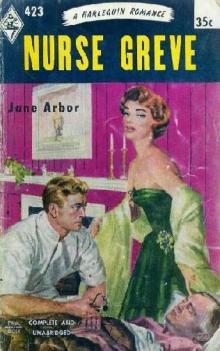 Nurse Greve
Nurse Greve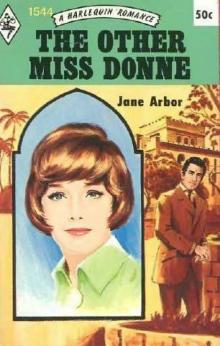 The Other Miss Donne
The Other Miss Donne